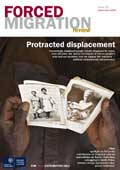UNHCR Bosnia held a launch event for FMR 33 in Sarajevo in order to use it to highlight the continuing need for durable solutions for those living in protracted displacement in the Balkans and to press for political progress in Bosnia-Herzegovina. Walter Kälin, Representative of the UN Secretary General on the human rights of internally displaced people, was invited to address the meeting at the event which was held on 12th November 2009. FMR Co-Editor Maurice Herson spoke at the event….[read more]
See download options opposite: download the full pdf or go to ‘contents list’ to view or download individual articles. We encourage you to circulate or reproduce any articles in their entirety but please cite http://www.fmreview.org/protracted.htm
FMR 33 is published in English, French, Arabic and Spanish.
Printed copies of FMR are free of charge. If you would like to receive a print copy for your organisation, or multiple copies for distribution to partners and policy/decision-makers or for use at conferences/workshops, please contact the Editors at fmr@qeh.ox.ac.uk. We will need your full postal address and details about how many copies (in which language/s) you require.
While we want to share the contents of this issue as widely as possible, we ask you to think carefully about how many print copies you need; please remember that it is available online, that print copies can be shared, and that printing and postage use up more resources than purely money.
We would like to thank the following donors for providing funding specifically for this issue: the Canadian International Development Agency, the Australian Government Department of Immigration and Citizenship, and UNHCR’s Regional Bureau for Africa.
